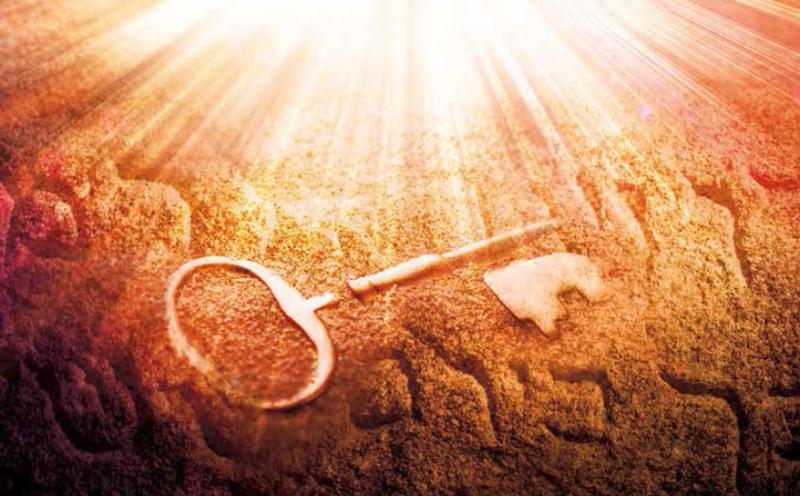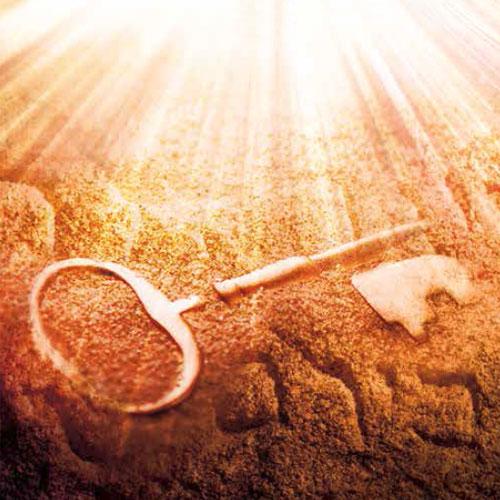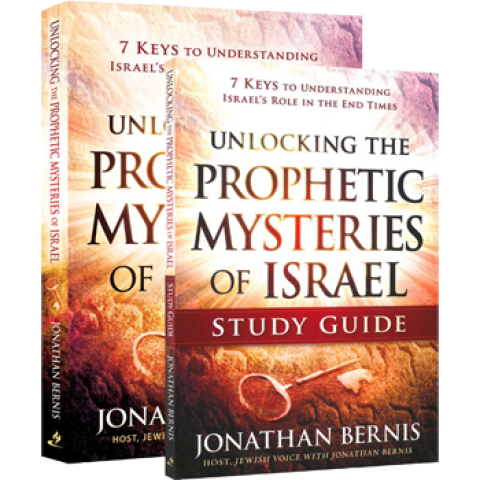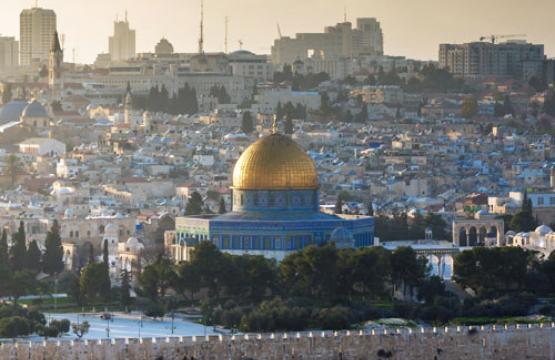
For I am not ashamed of the gospel, because it is the power of God that brings salvation to everyone who believes: first to the Jew, then to the Gentile.– Romans 1:16 (NIV)
Editor’s Note: Following is an excerpt from Chapter 5 of Jonathan Bernis’ new book, Unlocking the Prophetic Mysteries of Israel. To learn more about this exciting new book, including how to receive your own copy, please see pages 8-9.
The woman was shocked when the young man spoke to her. She was a Samaritan. He was a Jew. And everybody knew Jews looked down their noses at Samaritans. They considered them to be half-breeds, mongrels who had thrown away their godly heritage by intermarrying with non-Jews.
The Jews were also incensed that the Samaritans had the temerity to look down on them. They insisted that they had an older, and therefore more accurate, version of the Holy Scriptures and that their Mount Gerazim, not Jerusalem, was sacred to God.
Jews hated the Samaritans so much that when they were traveling from Judea to Galilee, or vice versa, they usually went miles out of their way to avoid setting foot in Samaria. But here was this fellow, apparently going straight through her country and also asking her to draw Him a drink of water from the nearby well. The rest of the story is found in the fourth chapter of the Gospel of John:
Then the Samaritan woman tells Him, “How is it that You, a Jew, ask me, a Samaritan woman, for a drink?” (For Jewish people don’t deal with Samaritans.)
Get the Unlocking the Prophetic Mysteries of Israel Package
One tiny nation Israel. It’s not the richest or most powerful country in the world, but in God’s eyes, Israel is the most important nation on Earth.
Yeshua replied to her, “If you knew the gift of God, and who it is who is saying to you, ‘Give Me a drink,’ you would have asked Him, and He would have given you living water.” “Sir,” the woman tells Him, “You don’t have a bucket, and the well is deep. Then from where do You get this living water?”
Yeshua replied to her, “Everyone who drinks from this water will get thirsty again. But whoever drinks of the water that I will give him shall never be thirsty. The water that I give him will become a fountain of water within him, springing up to eternal life!”
“Sir,” the woman tells Him, “give me this water, so I won’t get thirsty or have to come all the way here to draw water!” He tells her, “Go call your husband, and then come back here.”
“I don’t have a husband,” the woman replied.
Yeshua tells her, “You’ve said it right, ‘I have no husband.’ For you’ve had five husbands, and the man you have now isn’t your husband. This you’ve spoken truthfully!”
“Sir,” the woman tells Him, “I see that You are a prophet!
“Our fathers worshiped on this mountain, but you all say that the place where we must worship is in Jerusalem.”
Yeshua tells her, “Woman, believe Me, an hour is coming when you will worship the Father neither on this mountain nor in Jerusalem. You worship what you do not know; we worship what we know, for salvation is from the Jews. But an hour is coming—it is here now— when the true worshipers will worship the Father in spirit and truth, for the Father is seeking such people as His worshipers. God is Spirit, and those who worship Him must worship in spirit and truth.”
The woman tells Him, “I know that Messiah is coming (He who is called the Anointed One.) When He comes, He will explain everything to us.”
Yeshua tells her, “I—the One speaking to you—I am.” —John 4:9–11, 13–26
What the World Owes the Jews
There are so many lessons to be learned from this passage of Scripture. For example, when the woman asks, “How is it that You, being a Jew, ask me for a drink since I am a Samaritan woman?” we see that Yeshua’s ministry will extend beyond just the Jewish people and include Gentiles and even Samaritans (who were even more despised than the Gentiles).
The Jews and the Samaritans were well aware that sin had brought sickness and death into the world. When Yeshua tells the woman about the water He can give her, the water that will make it so she never thirsts again, He is telling her that she too can have eternal life through faith in Him. This is a signal that His Messianic mission goes beyond what the Jews were expecting. Yeshua is more than just the King Messiah who will liberate the Jews from Roman occupation of their land and reestablish the kingdom of Israel. He is the Savior of the world.
But the main thing I want us to take away from this conversation is Yeshua’s proclamation that “salvation is from the Jews.” From the very first time He spoke to Abraham, God had already chosen Abraham’s descendants to be a light to the nations and bring blessing and salvation to the world. But salvation was to be offered to them first and then through them to all the nations of the world.
Get the Unlocking the Prophetic Mysteries of Israel Package
One tiny nation Israel. It’s not the richest or most powerful country in the world, but in God’s eyes, Israel is the most important nation on Earth.
The world owes the Jewish people a great debt of gratitude. Yeshua came into the world through the Jews, and they will also play a central role in His return. Any discussion of the last days is incomplete if it doesn’t give a prominent role to Israel and the Jewish people.
It is only because of what Yeshua, a Jew, accomplished when He suffered and died on the cross on our behalf that God sees us as holy, set apart, sanctified, and pure. This is a wonderful promise of the new covenant—a promise that was originally given to Israel alone but that Gentiles receive by an engrafting into God’s family through faith in Yeshua. It is through this engrafting that Gentiles become partakers in all the promises and blessings of God.
Paul says the gospel is to the Jew first (Romans 1:16) because all the promises of God were first given to the Jews. Yeshua the Messiah came as a Jew, born of Jewish parents in a Jewish land, and followed the Jewish customs and practices. His disciples were all Jews and, as we’ve already seen, His earthly ministry was devoted to His own people. He fulfilled the prophecies written by Jewish men in the Jewish Scriptures. What could be more Jewish than to believe in such a Messiah?
John 3:16 says God so loved the world that He gave His one and only Son for all of mankind—Jews and Gentiles alike. But His earthly ministry—His miracles, healings, and teachings—were given to and for the Jewish people. This is very important to understand: the promises and blessings of the new covenant were given to the Jew first, and then, some thirty years later, were opened to the Gentiles.
Thus, the fifth key to unlocking the prophetic mysteries of Israel is to understand that the gospel is to the Jew first, and this precedent remains in effect today. In fact, it is the key that unlocks the gospel’s growth to the nations. When we grasp the truth that every Gentile who has received Jesus as Lord and Savior heard the gospel because of the faithfulness of those original Jewish disciples who took the gospel to the ends of the earth, we then realize what a great debt of gratitude we owe to the Jewish people.
It is only because of what Yeshua, a Jew, accomplished when He suffered and died on the cross on our behalf that God sees us as holy, set apart, sanctified, and pure.
The Gospel to the Nations
In my book A Rabbi Looks at the Last Days, I told of how God called me to move to Russia to share the good news of the Messiah with the Jewish people there. It was a truly amazing time in my life, and if you haven’t yet read that book, I invite you to do so. There is so much I’d like to share with you regarding those years in Russia, but, as I said, much of it is already recorded in my previous book.
One of the stories I related had to do with an experience I had while flying from the former Soviet Union to a speaking engagement in Uppsala, Sweden. On the airplane as I was reading Matthew 24, which talks about the Messiah’s return from heaven in the last days, the Holy Spirit drew my attention to a single word in verse 14: “nations.”
This verse says that the gospel must be proclaimed to all nations before Yeshua’s return. Now, I knew both the Hebrew and Greek translations for this word. In Hebrew, nations is goy (Gentiles), and goyum means “people of the nations.” The Greek word for nations is ethnos, from which we derive the word ethnic.
Whenever I read this passage of Scripture previously, I thought of nations as landmasses set apart by geopolitical boundaries established by man. Yet on that flight, I realized the word used in this verse literally means “race,” “tribe,” or, in today’s vernacular, “people group” or ethnic group. 1
As we have already discussed, the Jewish people have been scattered all over the world. It is rare to find a country without at least some Jews. And the same is true of many other ethnicities. In nearly every nation on earth, you will find a number of distinct people groups. Think of the United States, where there are millions of people of African and Hispanic descent, plus Americans from China, Korea, Vietnam, Ireland, Britain—people from every nation on earth.
When Jesus said the gospel of the kingdom must be preached to every ethnos, He was not saying we had to reach only geopolitical countries. He was saying we had to reach the distinct ethnic groups that live within those countries. This is a great calling for us!
When this is coupled with what Paul tells us in Romans 1:16, that the gospel is “to the Jew first” and then to the nations, we see the priority of taking the gospel to every community in every country where the Jewish people have been scattered. In my mind, this is the missing link in world missions. Reaching the Jewish people is a vitally important key to reaching the nations for Yeshua.
Get the Unlocking the Prophetic Mysteries of Israel Package
One tiny nation Israel. It’s not the richest or most powerful country in the world, but in God’s eyes, Israel is the most important nation on Earth.
In Romans 11:11–15, we are told that Israel’s rejection of Jesus as their Messiah has now caused the gospel to go to the nations (ethnos). What a blessing this is for those who were not born Jewish. But if that was a blessing, what greater blessing is in store when the Jews come back to God by recognizing Yeshua is their promised Messiah!
Paul called himself “the apostle to the Gentiles,” and it’s easy to see why. He traveled throughout the entire known world to spread the good news of the Messiah, Jesus. Even so, everywhere Paul went, he demonstrated this precedent that the gospel was to the Jew first. A careful reading through the Book of Acts will show that whenever Paul went into a new community, the first thing he did was preach the gospel in the local synagogue. Following are some examples:
Immediately, something like scales fell from Saul’s eyes, and he regained his sight. Then he got up and was immersed; and when he had taken food, he was strengthened. Now for several days, he was with the disciples in Damascus. Immediately he began proclaiming Yeshua in the synagogues, saying “He is Ben-Elohim.”– Acts 9:18–20
When they arrived at Salamis, they began to proclaim the word of God in the Jewish synagogues. They also had John as a helper.– Acts 13:5
Setting sail from Paphos, Paul’s company came to Perga in Pamphylia. John left them and returned to Jerusalem. But they passed on from Perga and came to Antioch of Pisidia. Entering the synagogue on the Shabbat, they sat down. After the reading of the Torah and the Prophets, the synagogue leaders sent to them, saying, “Brothers, if you have any word of encouragement for the people, speak.”– Acts 13:13–15
Now in Iconium, the same thing happened—they entered as usual into the Jewish synagogue and spoke in such a way that a large number of Jewish and Greek people believed.– Acts 14:1
After passing through Amphipolis and Apollonia, they came to Thessalonica, where there was a Jewish synagogue. As was his custom, Paul went to the Jewish people; and for three Shabbatot, he debated the Scriptures with them. He opened them and gave evidence that Messiah had to suffer and rise from the dead, saying, “This Yeshua, whom I declare to you, is the Messiah.”– Acts 17:1–3
Get the Unlocking the Prophetic Mysteries of Israel Package
One tiny nation Israel. It’s not the richest or most powerful country in the world, but in God’s eyes, Israel is the most important nation on Earth.






